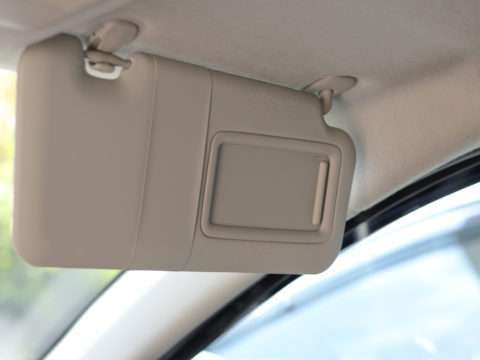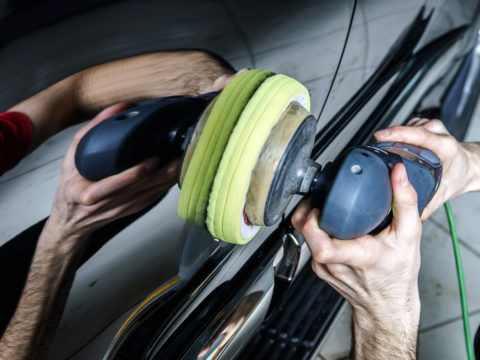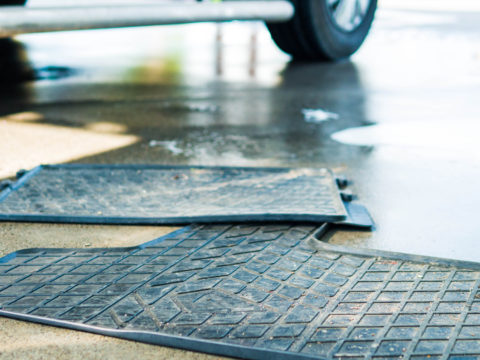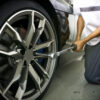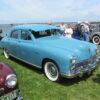This article will teach you how to get the smell of gas out of your car in the simplest-possible do-it-yourself method.
Did a gas can or other type of gas-holding container leak in your car? Did you or your gas attendant (you’ll know what a gas attendant is if you live in a state where you don’t pump your own gas like New Jersey) absentmindedly spill gas through your car window when you were at the gas pump? Yes? Ut-oh! The smell of gas is strong! Don’t worry: let’s continue so you can learn how to get rid of that pesky scent.
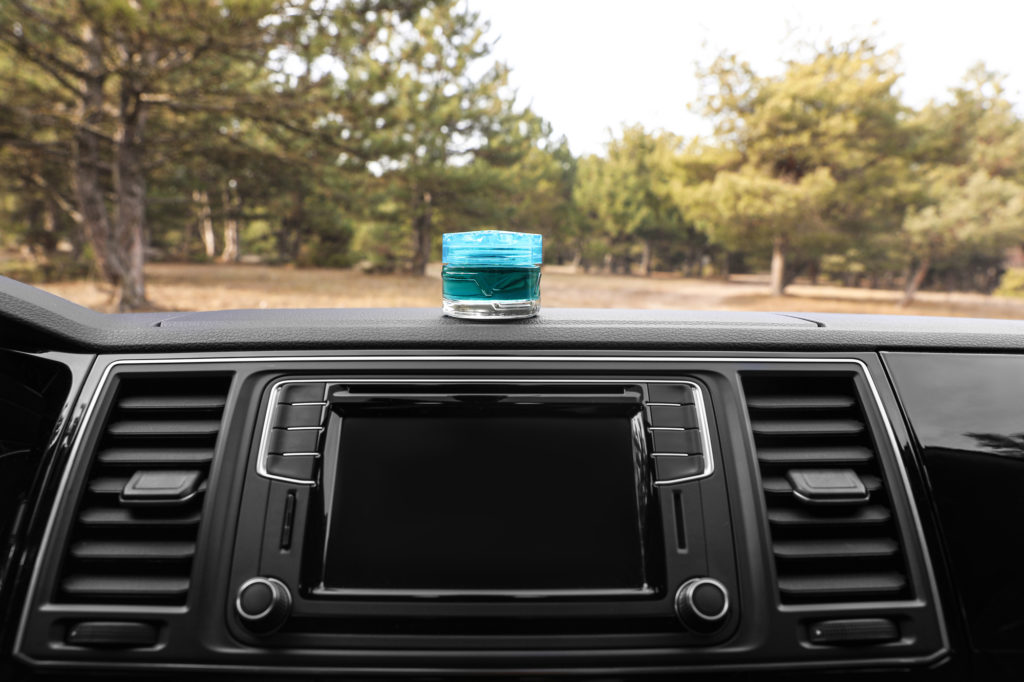
Contents
How do you get Spilled Gas Smell out of Your Car?
Here is a simplified, quick step-by-step guide getting your gasoline-scented car smelling fresh again (continue reading for a more detailed step-by-step guide):
- Locate the spill
- Sop up the liquid
- Clean the area
- Dilute the scene of the spill using water
- Aerate the car and allow gasoline to evaporate
- Use odor-absorbing products and air fresheners
a. Tools and Equipment Needed
- Gloves to protect skin
- N-95 mask if sensitive to fumes
- disposable rags or paper towels, scrubbing tools
- Surface or upholstery cleaner
- Odor eliminator
- Air freshener
b. Step 1: Locate the Spill
You’ll need to locate the spill if you don’t see where the spill occurred. Use your nose as a guide to finding where the scent is coming from. You can also visually inspect the area to find the wet spot. Using your hands to feel for the spot is not recommended as gasoline is a known skin irritant.
c. Step 2: Sop Up as Much Liquid as You Can
When you’ve found the spill, sop up as much of the liquid as you can while wearing gloves. Disposable rags or paper towels work well for this step.
d. Step 3: Remove More Gasoline Using a Cleaning Product
Next, you should use some kind of cleaning product to remove more of the gasoline. Be careful not to use any harsh chemicals that may react negatively when mixed with gas, and be sure to sop up all the extra cleaning products you used. A Baking soda and vinegar solution is an excellent all-natural choice.
e. Step 4: Dilute the Remainder
Dilute the remaining gasoline and cleaning product by applying water to the area and sopping up any excess moisture to allow a quicker drying process.
f. Step 5: Allow the Car to Aerate
If the weather is cooperating (or if you have a garage), open your windows and allow the car to aerate. This will eliminate any remaining fumes and allow any remaining gasoline to evaporate more quickly.
g. Step 6: Remove/Mask the Smell
Use appropriate air fresheners and odor absorbers to ensure the smell no longer bother you. Consider using a strong air freshener scent like evergreen, pine, or cherry until the aroma is entirely gone. Strong fragrances such as these will be proficient in masking any lingering gasoline smell.
You can use fabric spray such as Febreeze Extra Strength Fabric Odor Eliminator directly on your upholstery.
An all-natural odor eliminator works by absorbing odors and locking them into its own substance. These products should be strong enough to capture and contain even the worst of unwanted pet odors.
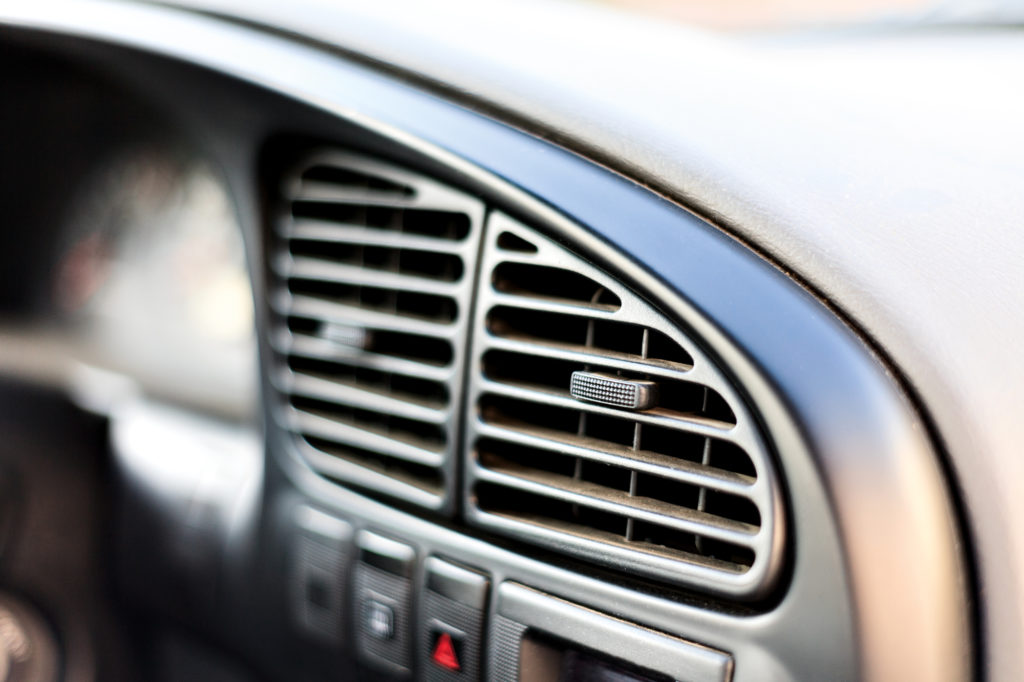
How do you get Gas out of Car Upholstery?
If you’re specifically looking to get gas out of car upholstery, follow all steps above, but consider using carpet or upholstery shampoo in a shampooer once completing step 5. If you do not have a shampooer, you can rent one from your local hardware store for a reasonable cost.
Pro tip: always spot-check to ensure the product will not damage the material!
What Can Get Gas Smell Out of Car?
There are many options when it comes to which products to use to remove the gas smell from your car.
One excellent (and super affordable) all-natural product is baking soda. Simply sprinkle baking soda over the spot after you’ve finished cleaning it and let it sit. Vacuum it up after a day or two, and any residual odor should be removed.
Enzyme cleaners are also great at removing odor. These products, such as Angry Orange, are more costly than baking soda, but they naturally disintegrate odor-causing agents such as gasoline. Just be sure to follow the above steps 1-5 to avoid mixing the solution with a concentrated amount of gas.
Does Gasoline Smell Actually Go Away?
Yes, the gasoline smell will disappear, but only once the gas has fully evaporated.
How Long Does it Take for Gasoline Smell to Go Away in Car?
Gasoline evaporates more quickly than water. However, gasoline’s fume-causing density is very high. This means that the gas will evaporate more rapidly than water, but the fumes (smell) are very strong until the evaporation process is complete. Consider the material where it was spilled, how much got spilled, temperature, and humidity level to estimate how long this process may take.
Can the Smell of Gasoline Kill You?
It’s improbable that the smell of gasoline would kill you. However, gasoline is toxic and highly flammable. It’s also a toxic substance, and the substance itself can easily kill someone if they ingest it.
Chronic inhalation of gasoline vapors can cause death. Vapors are unlikely to be fatal; however, extended periods of exposure can lead to awful health consequences.
Gasoline is also an extreme irritant to the skin, eyes, and lungs. This is why it’s best if you use protective gloves, such as cleaning gloves, during your gasoline-spill cleanup process. Using an N-95 mask will also drastically reduce the amount of vapors and fumes you’re exposed to during the cleaning process.
Closing Thoughts
No one wants to drive around in a car that smells like gas. Don’t stress! Following the above steps will provide you with a clear path to driving a clean-smelling vehicle in no time. It shouldn’t be a costly process – all it really takes is a little elbow grease, and everyday household items and products can be used if you’re finding yourself in a financial pinch. Easy Peasy!


